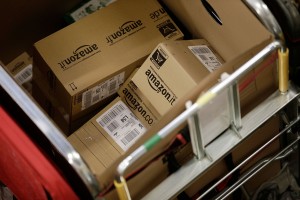 Amazon. A great big, greedy multinational company. Destroying countless companies and even eradicating whole industries in a matter of years.
Amazon. A great big, greedy multinational company. Destroying countless companies and even eradicating whole industries in a matter of years.
France has recently taken measures to protect book shops, as it understands the devastating impact Amazon’s operations can have on a country. Jeff Bezos (Amazon’s founder) argues that “Amazon is not happening to book selling, the future is happening to book selling” suggesting that people want to buy books online now, and that virtual books would be rising in popularity without Amazon’s help.
In the UK, Amazon have come under scrutiny for not paying their fair share of tax.
BBC research suggests that the way in which Amazon treat their employees, means that their employees face a higher risk of mental illness.
There are numerous other scandals surrounding this online retail giant, but is it all bad? Believe it or not, Amazon is also proving a critical element in the survival of some industries and communities.
Royal Mail
 The Royal Mail has had a turbulent decade. The internet has started to reduce the number of letters sent. Why pay to send a letter when you can send an email for free? Why fill your house with bank statements and insurance documents, when you can now access them all online? There are of course reasons why you might want to send a letter or receive a hard copy of something, however ultimately, the rise of the internet has significantly impacted the demand for postal services.
The Royal Mail has had a turbulent decade. The internet has started to reduce the number of letters sent. Why pay to send a letter when you can send an email for free? Why fill your house with bank statements and insurance documents, when you can now access them all online? There are of course reasons why you might want to send a letter or receive a hard copy of something, however ultimately, the rise of the internet has significantly impacted the demand for postal services.
Amazon has actually played a critical role in the success of Royal Mail over the last few years. Yes if someone shops online, shops loose out on purchases, however online orders have to be delivered somehow, and the organisation with by far the biggest distribution network in the UK, is the Royal Mail. As a result, Amazon currently work closely with Royal Mail and provide the organisation with a massive amount of business.
So am I saying Amazon is actually good for Royal Mail? Well until Amazon opens up its own distribution network, and fills the skies with drones, yes, I think it is.
Rural Communities
Remote communities are often cut off from the rest of society in many ways. They often have very few local shops, which do not stock a wide range of goods, meaning local residents often have to travel miles to shop, or just go without. If you want to buy a new radio alarm clock (costing £20) do you take a 30 mile round trip to the nearest town to buy it, or do you order it on Amazon – probably for £15 – and have it delivered to your door the next day?
Without Amazon (and other online retailers) such communities would be cut off, leading to people either having to leave, or them feeling isolated and outdated.
Small Retailers
Like eBay, Amazon lets anyone buy and sell their goods through the site. Customers have the assurance that they will get good customer service, and if something goes wrong, Amazon will deal with the problem.
Many individuals now make a living from selling goods through Amazon. Some manufacturers sell directly through Amazon. Some people buy goods somewhere else and then sell them on Amazon for a profit. So Amazon is creating more jobs than just those who work for the company.
Authors
Amazing, J.K. Rowling struggled to get the first book of her Harry Potter series published. She was turned down several times, before she eventually managed to persuade Bloomsbury to publish her book. Amazon lets anyone publish a book. Nobody reviews it to see if it is any good, it just gets ran through a copyright checker, which determines whether it is original or not, and therefore how much of any profits the author is able to take home.
Our in-house expert on this is Mr Hankins, so if you want any more info, check out his article on the book he wrote and published on Amazon, and feel free to ask him question there.
Are Amazon another Google? Do they want to own everything, and destroy all their competition. Probably yes. But need everything they do be negative? No, almost everything they do will have some good related to it.


